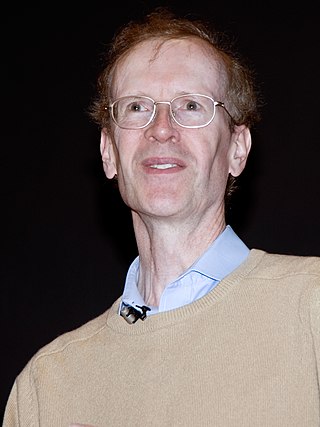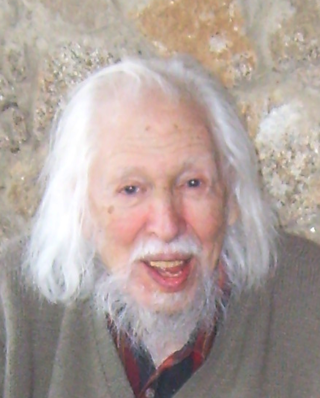Other uses
- National School Lunch Program, a United States government program.
- No such thing as a free lunch, an economic concept.
- No free lunch theorem, mathematical folklore.
- No free lunch in search and optimization, mathematical theorem.
A free lunch is a meal offered as a sales enticement.
Free Lunch may also refer to:
ATP may refer to:

Sir Andrew John Wiles is an English mathematician and a Royal Society Research Professor at the University of Oxford, specialising in number theory. He is best known for proving Fermat's Last Theorem, for which he was awarded the 2016 Abel Prize and the 2017 Copley Medal and for which he was appointed a Knight Commander of the Order of the British Empire in 2000. In 2018, Wiles was appointed the first Regius Professor of Mathematics at Oxford. Wiles is also a 1997 MacArthur Fellow.

Raymond Merrill Smullyan was an American mathematician, magician, concert pianist, logician, Taoist, and philosopher.

A mathematical proof is a deductive argument for a mathematical statement, showing that the stated assumptions logically guarantee the conclusion. The argument may use other previously established statements, such as theorems; but every proof can, in principle, be constructed using only certain basic or original assumptions known as axioms, along with the accepted rules of inference. Proofs are examples of exhaustive deductive reasoning which establish logical certainty, to be distinguished from empirical arguments or non-exhaustive inductive reasoning which establish "reasonable expectation". Presenting many cases in which the statement holds is not enough for a proof, which must demonstrate that the statement is true in all possible cases. A proposition that has not been proved but is believed to be true is known as a conjecture, or a hypothesis if frequently used as an assumption for further mathematical work.

Karl Theodor Wilhelm Weierstrass was a German mathematician often cited as the "father of modern analysis". Despite leaving university without a degree, he studied mathematics and trained as a school teacher, eventually teaching mathematics, physics, botany and gymnastics. He later received an honorary doctorate and became professor of mathematics in Berlin.
"No such thing as a free lunch" is a popular adage communicating the idea that it is impossible to get something for nothing. The acronyms TANSTAAFL, TINSTAAFL, and TNSTAAFL are also used. The phrase was in use by the 1930s, but its first appearance is unknown. The "free lunch" in the saying refers to the formerly common practice in American bars of offering a "free lunch" in order to entice drinking customers.
Proof theory is a major branch of mathematical logic and theoretical computer science within which proofs are treated as formal mathematical objects, facilitating their analysis by mathematical techniques. Proofs are typically presented as inductively-defined data structures such as lists, boxed lists, or trees, which are constructed according to the axioms and rules of inference of a given logical system. Consequently, proof theory is syntactic in nature, in contrast to model theory, which is semantic in nature.
Any kind of logic, function, expression, or theory based on the work of George Boole is considered Boolean.
Classification is a process related to categorization, the process in which ideas and objects are recognized, differentiated and understood. Classification is the grouping of related facts into classes. It may also refer to a process which brings together like things and separates unlike things.
PST may refer to:
NFL is the National Football League, the highest-level professional American football league in the United States.
Fundamental may refer to:
Specified complexity is a creationist argument introduced by William Dembski, used by advocates to promote the pseudoscience of intelligent design. According to Dembski, the concept can formalize a property that singles out patterns that are both specified and complex, where in Dembski's terminology, a specified pattern is one that admits short descriptions, whereas a complex pattern is one that is unlikely to occur by chance. Proponents of intelligent design use specified complexity as one of their two main arguments, alongside irreducible complexity.
In mathematical folklore, the "no free lunch" (NFL) theorem of David Wolpert and William Macready, alludes to the saying "no such thing as a free lunch", that is, there are no easy shortcuts to success. It appeared in the 1997 "No Free Lunch Theorems for Optimization". Wolpert had previously derived no free lunch theorems for machine learning.

In computational complexity and optimization the no free lunch theorem is a result that states that for certain types of mathematical problems, the computational cost of finding a solution, averaged over all problems in the class, is the same for any solution method. The name alludes to the saying "no such thing as a free lunch", that is, no method offers a "short cut". This is under the assumption that the search space is a probability density function. It does not apply to the case where the search space has underlying structure that can be exploited more efficiently than random search or even has closed-form solutions that can be determined without search at all. For such probabilistic assumptions, the outputs of all procedures solving a particular type of problem are statistically identical. A colourful way of describing such a circumstance, introduced by David Wolpert and William G. Macready in connection with the problems of search and optimization, is to say that there is no free lunch. Wolpert had previously derived no free lunch theorems for machine learning. Before Wolpert's article was published, Cullen Schaffer independently proved a restricted version of one of Wolpert's theorems and used it to critique the current state of machine learning research on the problem of induction.

A school meal is a meal provided to students and sometimes teachers at a school, typically in the middle or beginning of the school day. Countries around the world offer various kinds of school meal programs, and altogether, these are among the world's largest social safety nets. An estimated 380 million school children around the world receive meals at their respective schools. The extent of school feeding coverage varies from country to country, and as of 2020, the aggregate coverage rate worldwide is estimated to be 27%.
In physics and cosmology, the mathematical universe hypothesis (MUH), also known as the ultimate ensemble theory, is a speculative "theory of everything" (TOE) proposed by cosmologist Max Tegmark.
Continuity or continuous may refer to:
In mathematics and information theory of probability, a sigma-martingale is a semimartingale with an integral representation. Sigma-martingales were introduced by C.S. Chou and M. Emery in 1977 and 1978. In financial mathematics, sigma-martingales appear in the fundamental theorem of asset pricing as an equivalent condition to no free lunch with vanishing risk.
David Hilton Wolpert is an American physicist and computer scientist. He is a professor at Santa Fe Institute. He is the author of three books, three patents, over one hundred refereed papers, and has received two awards. His name is particularly associated with a theorem in computer science known as "no free lunch".